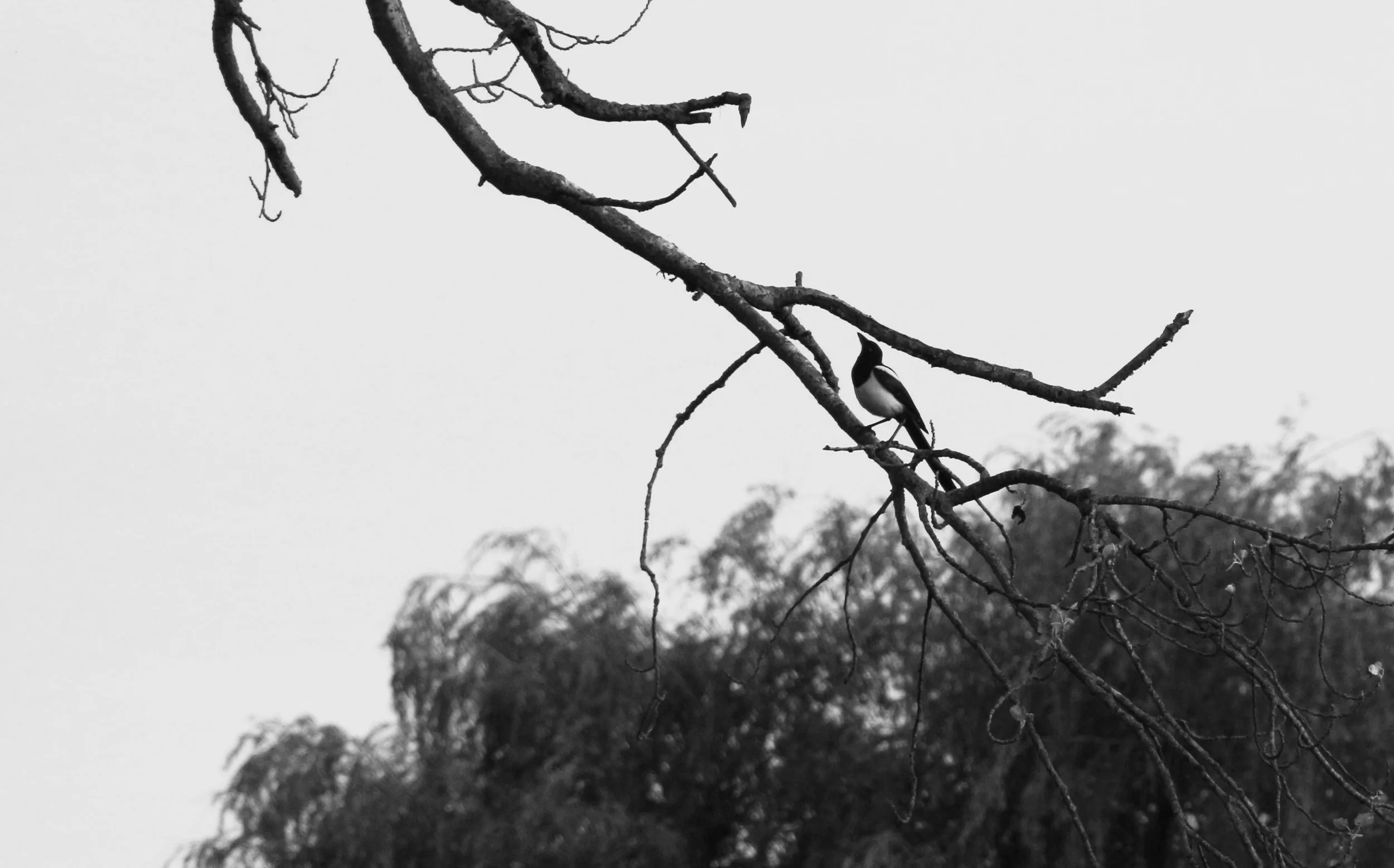The Hour of the Magpies
/By Roslyn Weaver
Sunrise. It is the time of the magpies, their self-appointed duty to wake us, black-masked and ominous, with skeletal rattles as they laugh the day into being. That wakening slithering sound, a grotesque Grim Reaper at Carnival or Día de los Muertos, with skull’s jaws for macabre maracas, dancing on the grave of our repose.
Awaken. Come with me, to the river. But stop, first, here. In the willows are the witterings of tits that twitter and titter. Squeaker, squeaker, a rusty door hinge, a tired water pump in need of oil. Specks of blue and yellow and black dart from branch to leaf and back, tits on insect quests. I call a greeting, but their answering pause is sudden and curious – squeaker? squeaker? – before they return to the chase. Squeaker! Squeaker! Squeaker! Squeaker!
Let’s leave them and walk past the fields of Christchurch Meadows, barren of leaf and tree / plump with football and frisbee. The Thames, The Thames, let’s follow its curves. The Thames’ denizens, the swans, swoop past; their wings flapping that precipice between air and water, sounding the slap and clap of an audience’s applause for an orchestra; footstamping too, as heavy wings pummel against water’s top. High above wheel the red kites, their shrill and spiralling whee-ee--whee calls imperiously demanding our attention.
Along the river path we walk, wandering through and sidestepping geese sitting squatly in the way. But here, here is the village of the damned; geese issuing the unearthly shrieks of tormented souls from the seventh circle of hell. Children sob at the sound, weeping at the knowledge that not all is good and wonderful in this world after all. Mothers, fathers, grandparents, abandon their well-intentioned bread-feeding and hasten away, promising each other to never sing along to Feed the Birds again. Coots and moorhens weave steady black-robed trails between fleeing families and keening geese, heads earnestly bent, intent on the ground, quiet and devoted pilgrims of sustenance.
Leave the river. Follow the dense paths, concreted / compacted, prim edges shackling what was once wilderness. The pigeons determinedly waddle from crisp packet to biscuit crumb, scattering only at the last as we step between them. They shake off our presence, their flights taking on the steady fwoop, fwoop of helicopter rotor blades as they slowly beat the air to get away.
But stop, here. Lean into the hedge, quietly, carefully, slowly. This here houses the sparrows. Maybe we will see them, those bobbing balls of brown bustling round and bouncing up and down, their fluffy squeaks and puffy cheeps, a house party of sparrows pocketed by the hedge, turning from side to side to say hello, hello, hello, to anyone caring to listen. I return their greeting. Hello, hello, hello. I ask how they are. Hello, hello, hello. I say farewell. Hello, hello, hello.
There is another party, not far away, pitting the bare-boned branches of the sycamore at the end of the meadow. Listen. That distant sound – that cackling and crackling cacophony, a rippling and riotous refrain – is that of the starlings, a tree of sound that suddenly removes itself from the branches and rears up, revealing itself as a murmuration, shapes lazily forming, dissolving, and reforming in the skies. Gaze for a moment. Step into wonder.
Break the reverie for the robin. It is alone. It is always alone. Flash of crimson, cocked head, clear high notes that pipe sweet joy into hearts, with occasional clicks and clucks of disapproval at those noisy, messy crowds around it. Go back to solitary roaming in your oak tree, young robin, and thank you for your song.
But now day is done and it has come at the last. The dimming. The paths along the meadows are harder to make out in twilight’s cover, and that slithering sound of skeletal maracas steals into our ears once again. We are returning, and so too the magpies. At their appointed hour, they descend to claim the earth. The worms are theirs; caterpillars too. Hooded heads bent, face in shadow, harbingers of nocturnal horrors, makers of macabre magic / abracadabra maracamacabra/ as they feed, murky shapes on the ground in the lowering night.
But the dimming hour isn’t theirs alone. Somewhere, high above us, relaying from the darkening red chimneypots of the rows of terraces, it comes. That haunting twist of notes, softly slicing through the frosted and heavy evening air with the clarity of a blade. The song of the blackbird.
Earth tilts. Day turns, handing over dominion from human to bird to animal. From somewhere, behind the wooden-paling fence around the corner, comes the pad of paws, the glint of eyes chance-caught in the streetlight. Waiting.
Roslyn Weaver was born in Australia and lives in Berkshire. She works as a writer and editor with the occasional foray into photography. Her academic publications and other work can be found on roslynweaver.com.


